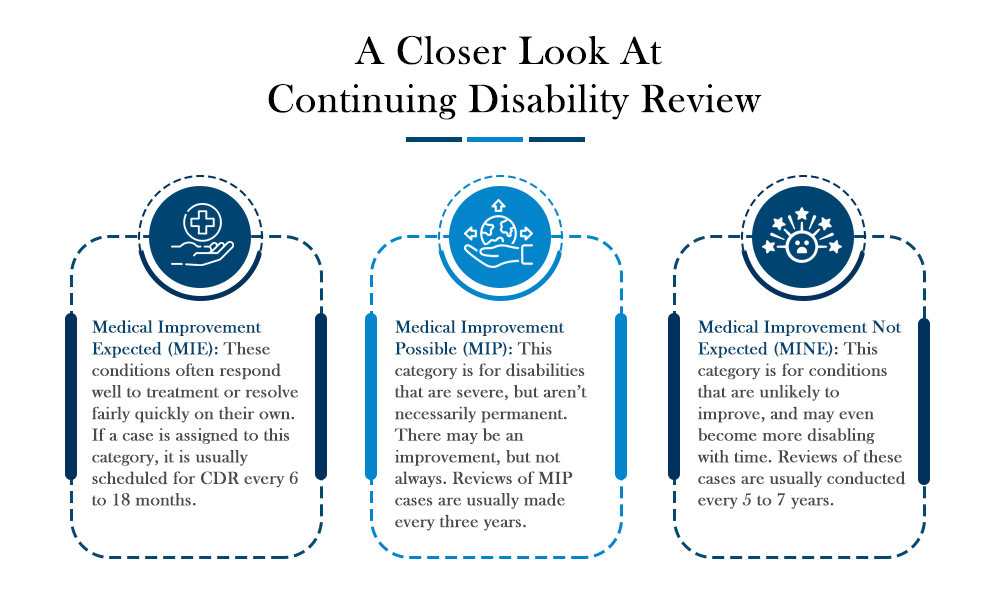If you are disabled and unable to work as a result of your disability, you may be receiving disability benefits from the Social Security Administration. These disability benefits are often incredibly helpful in relieving the financial burden that can come with being disabled. This is particularly true as time goes by, and you grow older. Understandably, if you find yourself in this situation, and you are age 50 or older, you may wonder how long you can continue to receive your benefits, or if there is any sort of review process to ensure that you can do so. These are important questions to ask.
A Closer Look At Continuing Disability Review
Periodically, after an applicant has been approved for disability benefits, the Social Security Administration will conduct what it calls a “continuing disability review,” or CDR for short. The purpose of the CDR is to ensure the beneficiary remains disabled and has not returned to work or otherwise begun earning a significant income in addition to receiving benefits.
Typically, the Social Security Administration is legally required to perform a CDR at least once every three years. As part of the CDR, the SSA reviews evidence regarding the recipient’s medical condition, income and resources, living conditions, and other relevant factors.

Following the initial CDR, the SSA will usually determine whether the disabling condition is likely to improve, or whether it is more permanent. The SSA ultimately assigns each claim to one of three Medical Improvement (MI) categories:
- Medical Improvement Expected (MIE): These conditions often respond well to treatment or resolve fairly quickly on their own. If a case is assigned to this category, it is usually scheduled for CDR every 6 to 18 months.
- Medical Improvement Possible (MIP): This category is for disabilities that are severe, but aren’t necessarily permanent. There may be an improvement, but not always. Reviews of MIP cases are usually made every three years.
- Medical Improvement Not Expected (MINE): This category is for conditions that are unlikely to improve, and may even become more disabling with time. Reviews of these cases are usually conducted every 5 to 7 years.
In addition to looking at the condition itself, the Social Security Administration will also consider the individual’s age as a part of the review process.
How Does Age Affect My Continuing Disability Review?
As time goes by, we are more susceptible to injury, illness, and the limitations that come with aging. The SSA recognizes this reality and does not want to waste valuable time and resources conducting frequent reviews of aging individuals who become less likely to be able to resume employment as they age.
As a result, after an individual turns 50, the timeline for a CDR stretches to once every 5 to 7 years. This is true even if they are assigned to the MIE category for which reviews are typically conducted every three years. After age 50, age will also be an important factor that the SSA considers when determining an individual’s residual functional capacity – that is his or her ability to return to work and earn a steady income. Generally, this means that after age 50 it is easier to retain your disability benefits even despite a continuing disability review whereas it can often be more difficult for younger individuals.
A Word About Early Retirement
One final caveat for individuals age 50 and older is that these individuals should thoroughly consider the issue of retirement benefits before making any sort of decision as to whether or not to pursue those benefits earlier than normal. For those who are receiving Social Security disability benefits, deciding to pursue early retirement benefits may simply not be the best option.
Typically, those who opt for early retirement benefits receive somewhat less than they would receive if they waited until full retirement age. While this is true of Social Security retirement benefits, it is not true of Social Security disability benefits. Those individuals who are receiving Social Security disability benefits can receive an amount that would be equivalent to their full retirement disability amount up to the time they qualify for retirement. Thus, this option often makes more financial sense.
Liner Legal – Here For You
Wherever you are in the process of seeking disability benefits, you need a team of knowledgeable and experienced attorneys on your side. Whether you’re filing your initial application, pursuing an appeal, or whether you have questions about a disability review as you grow older, you don’t want to face complex and challenging legal matters alone. Instead, you can turn to the talented team at Liner Legal. We will fight tirelessly on behalf of every client we serve, and we will always pursue the best legal strategies on your behalf. If you’re ready to get started, we are here to help. Give us a call today. We look forward to speaking with you soon.







